SALEM, Ore. (KOIN) — Timber Unity is back in Salem, clogging streets around the Oregon Capitol to make sure their voices are heard on a cap-and-trade bill.
The rally began with a trucker convoy that slowed traffic during the Thursday morning commute. The demonstrators, driving big rigs, tractors, semis and dump trucks, have been making laps around the Capitol to show their opposition to the bill in an effort to derail the environmental legislation.
The event is a throwback to a nearly identical demonstration that took place last summer to protest a previous version of the bill.
This is the latest effort by Oregon lawmakers to create a cap-and-trade system to reduce greenhouse emissions and put a limit on the largest corporate polluters.
Representatives from the Oregon GOP oppose the greenhouse gas reduction plan that they say would cripple the economy and forever alter rural Oregonians way of life.
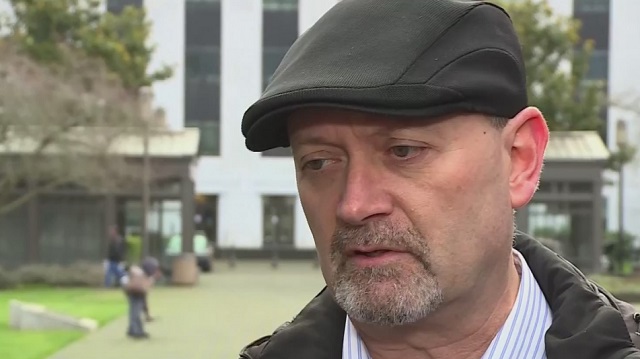
“We do need to deal with environmental issues, but destroying thousands to tens of thousands of jobs to do so is not in the best interest of Oregon,” said Oregon Republican Party Chairman Bill Currier.
But others in the farming industry say that isn’t so. Farmers came out in favor of the bill and its incentives.
“I’m here representing more than 250 farms and ranches and agricultural stakeholders who are not being represented by Timber Unity and the Farm Bureau today,” said Mimi Casteel of Hope Well Wine. “We support strong agricultural policy and I can speak first hand as an early adopter of climate friendly agriculture to all of the benefits that comes with adopting the practices that are supported in this bill.”
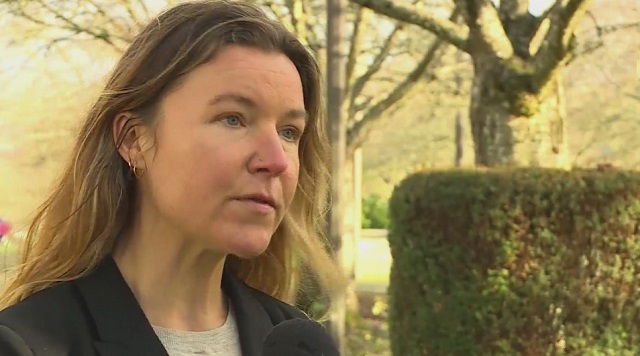
Farmers who support the bill said the climate crisis is something we will all have to deal with, especially those in the timber and agricultural industries. They say this cap-and-trade bill is something they can do right now to solve it.
The money from the largest polluters can be used to invest in efficient farm irrigation systems, paying to clean up forests and help transition these industries to clean energy like electric cars and trucks, supporters said.
The rally by Timber Unity continued throughout the day. A hearing on the cap-and-trade bill began in the afternoon.
Gov. Kate Brown agreed on Thursday to meet with representatives of Timber Unity. They want her to look at alternatives to cap-and-trade, including planting millions of trees along highways to capture some of the carbon and source more local goods and services.
But Brown believes capping emissions is the way to go.
Next Tuesday, climate activists will hold a rally at the State Capitol.
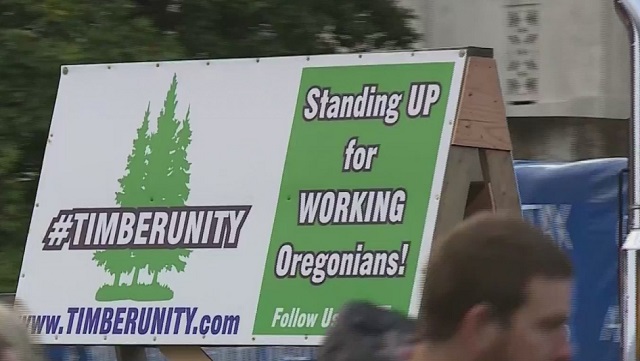
Don’t need a permit
Capt. Timothy Fox, Oregon State Police spokesman, wrote in an email that #TimberUnity planners expect between 800 to 1,000 trucks. He said it was expected to significantly affect traffic surrounding the Capitol, as well as routes from sites where protestors will gather before heading to the Capitol. Those sites include the Oregon State Fairgrounds in Salem, Volcanoes Stadium in Keizer and the Polk County Fairgrounds in Rickreall.
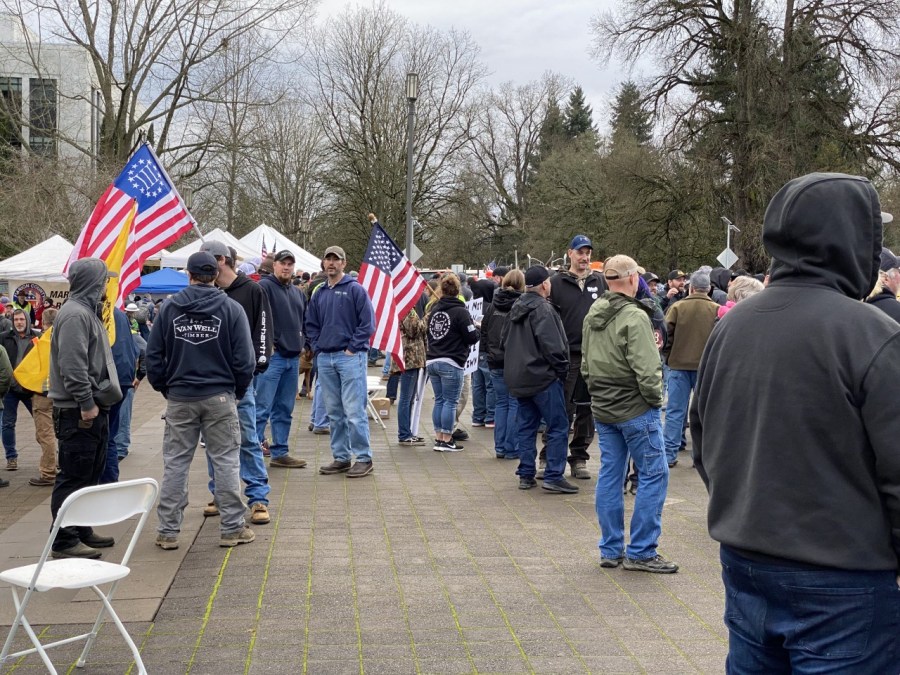
“The Capitol will be open and staffed accordingly to ensure everyone’s safety and rights are maintained,” Fox said, noting that several hundred people are expected to enter the Capitol to speak with legislators.
Salem Police Department spokesman Lt. Treven Upkes said that no local roads are expected to be closed because of the event, and organizers didn’t need a permit. He said there would be an unusual amount of Salem-area traffic from 7 to 9 a.m. the day of the event and from 3 to 4:30 p.m. as it ends.
Upkes said that organizers didn’t plan to have many vehicles drive around the Capitol. While Salem police will increase traffic enforcement, he said that as long as vehicles don’t block traffic and obeying laws they could drive around as long as they want. However, he said organizers plan to have vehicles do only one lap around the Capitol.
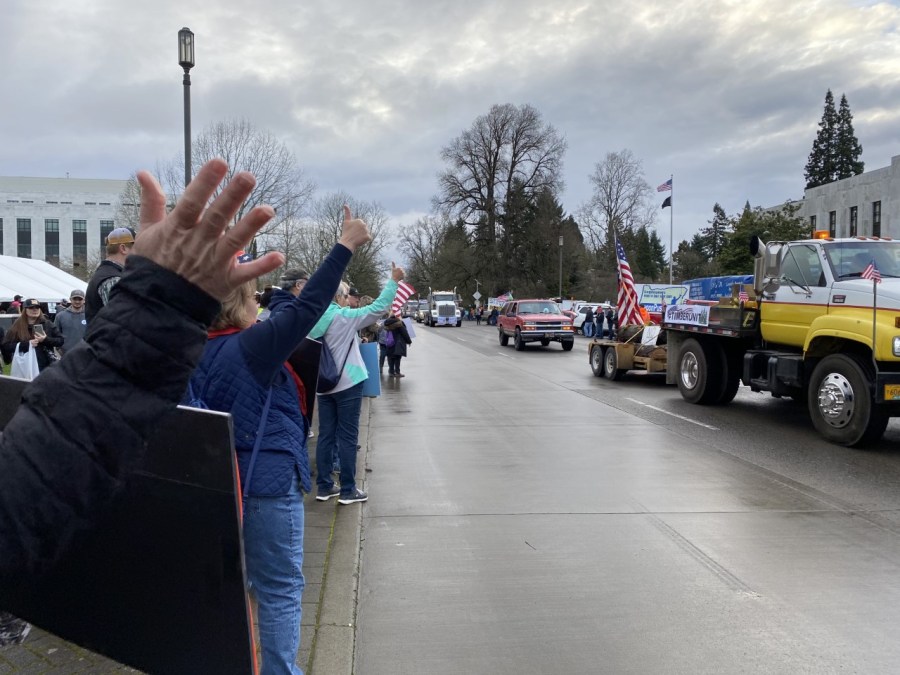
Hurting the most vulnerable
Sen. Michael Dembrow, a Portland Democrat sponsoring the controversial legislation, said on Monday, Feb. 3, that he had revised the legislation to address some concerns. He said the Legislature had received 1,500 pieces of written testimony so far.
Dembrow said the proposal has been changed to phase in the program affecting vehicle fuel by county, beginning with the Portland area in 2022 and then all counties west of the Cascades (as well as the Bend and Klamath Falls) in 2025. Amendments also carve out tax credits for low-income Oregonians to help with utility cost increases.
“We don’t want it to start in Portland, we don’t want it to trickle down to the rest of us,” said Angelita Sanchez who owns a trucking company. “We presented other options to the governor today and hope we can work on those.”
Sanchez said she wasn’t aware of the changes to accommodate low-income people but feels they won’t go far enough to insulate Oregonians. “We know that everything trickles down to the consumer,” she said.
Timber Unity board member Todd Stoffel, a Washington truck owner and operator with business in Oregon, agreed with Sanchez. He believes Oregon’s most vulnerable citizens, elderly on fixed incomes and low-income families, would be hurt.
“What they’ve done is give… these carve outs for big polluters over the next 30 years,” Stoffel said. “The rest of us end up paying the price with higher fuel prices, higher, double-digit energy cost increases, and on down the line.”